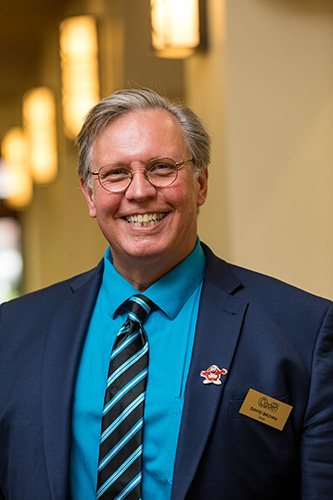WKU News
Dean Brown sees students as researchers, problem solvers
- Aurelia Spaulding
- Thursday, October 7th, 2021

“I have always felt that being a researcher and being an educator go hand in hand because as a researcher, you are discovering; you are creating new knowledge. Then, as an educator, you are sharing the knowledge, and you are relating it to the things that students know, hopefully in a way that they can start to build on. Then they’ll slingshot that on up to their own new, great discovery,” said Dean David Brown of Ogden College of Science and Engineering (OCSE). Brown began at WKU on July 1 with a focus on student-centered learning and giving students an opportunity to see themselves as real-world problem solvers.
Brown shared, “Involving students in the research not only provides a cool experience, it gives them practice at solving problems that don’t have an answer in the back of the book. That is the thing that really sets the research experience apart.”
As dean, Brown leads the nine academic units that make up the college. Students can choose from 57 majors, minors, and certificates in a wide array of science and engineering disciplines. OCSE provides countless opportunities for students to engage in applied learning and research through its 13 centers that fall under its Applied Research and Technology Program (ARTP), such as the Center for Energy Systems and Biodiversity Center as well as many others. Research looks different in different fields, but it has the common link of being a search for new knowledge about how the world works, how human minds work, or about the processes people use to interact in the world.
Brown explained that for student researchers, “You are facing real problems and having to use your ingenuity, having to bounce ideas off other people, work in groups, and find solutions. That is what we, as a society, want for all of our industrial workers, all of our educators, all of our politicians - basically every walk of life needs people who can solve problems well. So, the opportunity to be involved in research as an undergraduate student, graduate student, or beyond is all part of the learning experience.”
Dean Brown’s commitment to applied learning and research comes from years of his own experience in the field. Prior to coming to WKU, he led departments and taught subjects including introductory physics, quantum mechanics, nuclear physics, theoretical mechanics, computational science, and others. He even served on two research teams that were named in the citations for Nobel Prizes in physics in 2008 and 2013. He knows what experiences will help students while in college.
Brown’s goal is to make sure that OCSE contributes to meeting all of the missions of a comprehensive university. “We are involved in discovery, our students are involved, our students are getting a real hands-on application, preparing them for what comes next - whether that be a career or graduate school or whatever they may find.”
OCSE students can also become involved in discovery through participating in clubs. The college has a large number of academic clubs with more than 40 opportunities to get involved. Dean Brown plans for the college to do more to develop student groups so that they can better support students with making connections. He wants first-year students and transfers to begin to feel at home and feel connected right from the beginning.
“I am also looking at piloting a way to get students involved in research a little earlier through student mentoring. The way I envision it, older students who have had some research experience will work with newer students and help them solve a problem,” Brown said. “Pick a small problem. It doesn’t have to be groundbreaking but solve some problem where it is not easy to look up an answer. So, I am looking at ways to pilot a program to do that, so we make sure that students are really prepared when they move forward.”
Dean Brown shared a few interesting aspects about OCSE that some may know less about. They have a world-class farm, he said, where students live and work alongside faculty, staff, plants, and animals. They have the beautiful and ecologically significant Green River Nature Preserve adjacent to Mammoth Cave National Park. There are engineering labs where students work directly with industry and multi-disciplinary labs where they can explore extended reality. Students help run the University’s weather service, White Squirrel Weather. They can join the Crawford Hydrology Lab to understand underground water flow in the local karst system or ensure water quality for the region. They can join the region’s top research groups in Psychological Sciences, working on human cognition or suicide prevention, for example. Many labs involve students in hands-on bench research. Night owls might enjoy work at the Department of Physics and Astronomy’s Bell Astrophysical Observatory, just outside town, he included. The possibilities are many and varied.
“Having students doing hand-on projects makes such a transformational difference, not only for the students but for the community. There are really good people here and there are opportunities to make really exceptional programs if we can work together as a team,” Brown said. “I like being able to pull together a diverse team and to get everybody working together to accomplish great things.”
To learn more about Ogden College of Science and Engineering, please visit wku.edu/ogden.
Some of the links on this page may require additional software to view.

